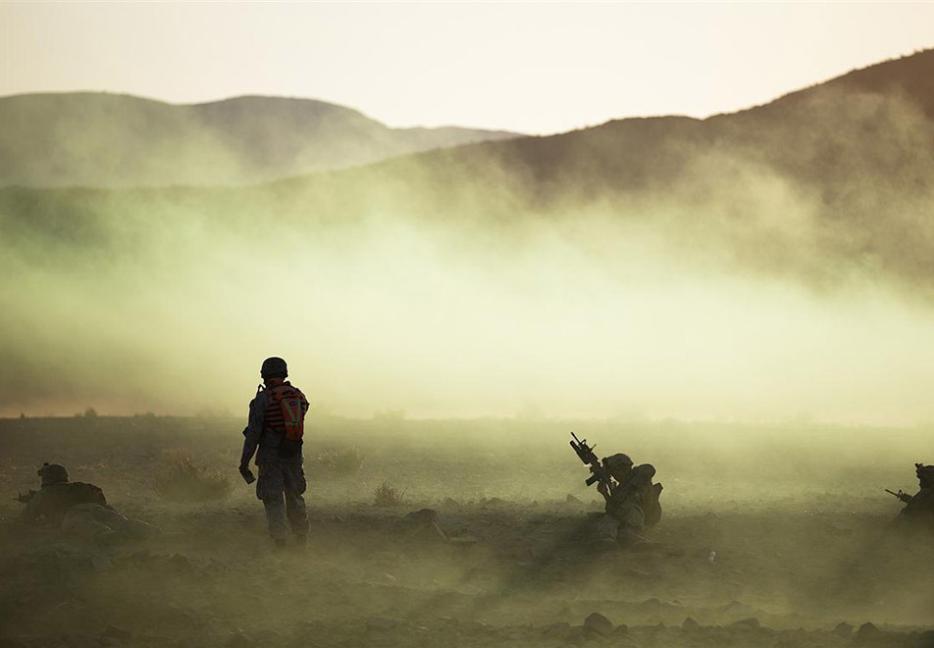Sascha DeNinno is six months pregnant and driving to Pueblo, Colorado, to see her husband in a psychiatric facility. Nic DeNinno came back from Iraq and tried to kill himself, and at the Haven Behavioral War Heroes Hospital he’s been keeping a journal and attending group sessions with other veterans to try to talk through what he saw and what he did.
David Finkel, whose book Thank You for Your Service follows Sascha and Nic along with other families of returning soldiers with severe PTSD, describes one of these sessions. One soldier tells how he found a skeleton with some skin still on it, and took pictures of himself holding up the femur and pretending to take a bite out of it. “I had a hard drive that I destroyed,” Nic says. “Pictures and stuff like that, next to dead bodies, shit like that. Horrible, horrible stuff. Horrible stuff. Us hanging out with dead bodies. At the time, I mean we were rockin’ and rollin’, we were mean mean killing machines. Now I look back and I’m like, God, what were we doing? What were we thinking?” Nic punched civilians in the face, waved guns at schoolchildren, and shoved shotguns into unarmed men’s mouths. When another soldier tells a story about kicking a pile of skulls into a ditch, Nic says, “That story right there—would you tell your wife that story?”
Sascha hasn’t heard any of Nic’s stories yet. On her eight-hour drive from Fort Riley, Kansas, where the couple lives, Sascha is hoping to convince her husband that he should confide in her. She’s hoping “that Pueblo would make him realize he could tell her anything about the war, anything at all. That she wanted to hear it. That she could take it.” But can she?
The lives of soldiers’ families are so fundamentally shaped by the military that spouses and children are often said to be wearing “invisible uniforms.” Mental illness in returning soldiers is also often referred to as an “invisible wound” of war. But PTSD in returning soldiers has become impossible to ignore, and for the first time researchers are also looking at a related epidemic that has, up to now, been doubly invisible—PTSD in soldiers’ partners and children.
Over the past several years, a number of studies have been conducted on family members of military personnel who present with PTSD symptoms. In 2011, a study found that of 190 wives of service members who had been diagnosed with probable PTSD, 170 experienced at least one PTSD symptom. A 2012 study of the wives of a set of PTSD-diagnosed soldiers found that 40 per cent of these wives also met the criteria for PTSD.
It seems impossible to contract a post-traumatic stress disorder from trauma you did not experience yourself. But the presence of PTSD in family members of soldiers may be further proof that we have not as yet fully understood what PTSD is and how it works. In the Clinical Child and Family Psychology Review, researchers William P. Nash and Brett T. Litz recently wrote that the medical establishment have thus far cast PTSD as a result of fear: the conventional view is that the condition results from exposure to “an event or events that involve actual or threatened death or serious injury, or a threat to the physical integrity of others’’ which the sufferer responds to with ‘‘intense fear, hopelessness, or horror.’’
Nash and Litz propose that PTSD is instead a result of what is termed “moral injury”—the shattering of one’s belief system. “Moral injury,” they write, “is not merely a state of cognitive dissonance, but a state of loss of trust in previously deeply held beliefs about one’s own or others’ ability to keep our shared moral covenant.” Soldiers coming back from wars that feature violence against civilians, cruelty to captured enemy combatants, and injury and death inflicted by friendly fire can no longer trust themselves or others.
Military families are generally proud of their participation in national defence, and a sense of public service is often what keeps them going through difficult conditions. The President of Sears Canada is a former U.S. Marine, and Sears recently ran a contest in military communities across the country for essays about what it’s like to be a child with parents in the military. The Grade 9/10 winner for the Quinte area, Lena Powers, wrote: “Being a military child is hard but rewarding. It is hard because parents are away a lot and miss a lot of things like birthdays, Christmas, Easter, and New Year’s. At the same time though it is rewarding because you know that somehow, somewhere a child the same as you, is getting the help that they deserve, given to them by Canadian heroes.”
Nash and Litz write: “To the extent they participate morally in military operations and their aftermath, while subscribing to military values and ideals, military spouses and children may be as vulnerable to moral injury as military service members.” It’s hard enough to come to terms with the ordinary human failings of our parents and partners, let alone when those failings include photos in which they pretend to eat dead bodies.
In the Roman Empire under Augustus, soldiers were prohibited from getting married. So were military slaves in the Ottoman Empire, and members of the French Foreign Legion until 1984. These bans were put in place in part because administrators didn’t want to pay for wives and children to travel with platoons, and in part because of the perception that marriage was a civilian luxury that would make soldiers soft—”a soldier married is a soldier spoiled,” as Lord Kitchener said. Recently, the armed forces have recognized that married soldiers benefit from the support at home—in fact, in 2011 Alison Howell wrote in the Literary Review of Canada about the danger of soldiers’ marriages becoming a tool for military strategy. Married soldiers, the administration believes, are better fighters.
Howell quotes a brochure from the Canadian Forces course in relationship training in which soldiers are admonished: “strong supportive relationships are paramount to your ability to remain mission-focussed.” There’s a certain amount of moral injury inherent in seeing your love for your husband put to work to make him into a mean mean killing machine.
Every week, Linda Besner reads a new book and writes on a tangentially related topic.
Image via Flickr user isafmedia





